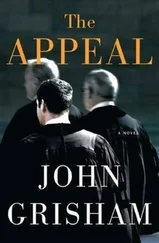“And who are you?”
“Rudy Baylor.”
He leans over and picks up an envelope from the desk. “This is for you,” he says. My name is handwritten in red ink. I unfold a short letter. My hands shake as I read it.
A voice squawks on his radio, and he backs away slowly. “Read the letter and leave,” he says, then disappears down the hall.
The letter is a single paragraph, Loyd Beck to me, breaking the news gently and wishing me well. The merger was “sudden and unexpected.”
I toss the letter on the floor and look for something else to throw. All’s quiet in the back. I’m sure they’re hunkered down behind locked doors, just waiting for me and the other misfits to clear out. There’s a bust on a concrete pedestal by the door, a bad work of sculpture in bronze of old man Brodnax’s fat face, and I spit on it as I walk by. It doesn’t flinch. So I sort of shove it as I open the door. The pedestal rocks and the head falls off.
“Hey!” a voice booms from behind, and just as the bust crashes into the plate glass wall, I see the guard rushing toward me.
For a microsecond I give thought to stopping and apologizing, but then I dash through the foyer and yank open the door to the stairs. He yells at me again. I race downward, my feet pumping furiously. He’s too old and too bulky to catch me.
The lobby is empty as I enter it from a door near the elevators. I calmly walk through the door, onto the sidewalk.
It’s almost seven, and almost dark when I stop at a convenience store six blocks away. A hand-painted sign advertises a six-pack of cheap lite beer for three bucks. I need a six-pack of cheap lite beer.
Loyd Beck hired me two months ago, said my grades were good enough, my writing was sound, my interviews went well, that the guys around the office were unanimous in their opinion that I would fit in. Everything was lovely. Bright future with good old Brodnax and Speer.
Then Trent & Brent waves a few bucks, and the partners hit the back door. These greedy bastards make three hundred thousand a year, and want more.
I step inside and buy the beer. After taxes, I have four dollars and some change in my pocket. My bank account is not much healthier.
I sit in my car next to the phone booth and drain the first can. I have eaten nothing since my delicious lunch a few hours ago with Dot and Buddy and Bosco and Miss Birdie. Maybe I should’ve eaten extra Jell-O, like Bosco. The cold beer hits my empty stomach, and there is an immediate buzz.
The cans are emptied quickly. The hours pass as I drive the streets of Memphis.
My apartment is a grungy two-room efficiency on the second floor of a decaying brick building called The Hampton; two seventy-five per month, seldom paid on time. It’s a block off a busy street, a mile from campus. It’s been home for almost three years. I’ve given much thought lately to simply skipping out in the middle of the night, then trying to negotiate some monthly payout over the next twelve months. Until now, these plans always included the element of a job and monthly paycheck from Brodnax and Speer. The Hampton is filled with students, deadbeats like myself, and the landlord is accustomed to haggling over arrearages.
The parking lot is dark and still when I arrive, just before two. I park near the Dumpster, and as I crawl from my car and shut the door, there is a sudden movement not far away. A man is quickly getting out of his car, slamming the door, coming straight for me. I freeze on the sidewalk. All is dark and quiet.
“Are you Rudy Baylor?” he asks, in my face. He’s a regular cowboy — pointed-toe boots, tight Levi’s, denim shirt, neat haircut and beard. He smacks gum and looks like he’s not afraid of pushing and shoving.
“Who are you?” I ask.
“You Rudy Baylor? Yes or no?”
“Yes.”
He jerks some papers from his rear pocket and thrusts them in my face. “Sorry about this,” he says sincerely.
“What is it?” I ask.
“Summons.”
I slowly take the papers. It’s too dark to read any of it, but I get the message. “You’re a process server,” I say in defeat.
“Yep.”
“Texaco?”
“Yep. And The Hampton. You’re being evicted.”
If I were sober I might be shocked to be holding an eviction notice. But I’ve been stunned enough for one day. I glance at the dark, gloomy building with litter in the grass and weeds in the sidewalk, and I wonder how this pathetic place got the best of me.
He takes a step back. “It’s all in there,” he explains. “Court date, lawyers’ names, etc. You can probably work this out with a few phone calls. None of my business though. Just doing my job.”
What a job. Sneaking around in the shadows, jumping on unsuspecting people, shoving papers in their faces, leaving a few words of free legal advice, then slithering off to terrorize someone else.
As he’s walking away, he stops and says, “Oh, listen. I’m an ex-cop, and I keep a scanner in my car. Had this weird call a few hours ago. Some guy named Rudy Baylor trashed a law office downtown. Description fits you. Same make and model on the car. Don’t suppose it fits.”
“And if it does?”
“None of my business, you know. But the cops are looking for you. Destruction of private property.”
“You mean, they’ll arrest me?”
“Yep. I’d find another place to sleep tonight.”
He ducks into his car, a BMW. I watch as he drives away.
Booker meets me on the front porch of his neat duplex. He’s wearing a paisley bathrobe over his pajamas. No slippers, just bare feet. Booker may be only another impoverished law student counting the days until employment, but he’s serious about fashion. There’s not much hanging in his closet, but his wardrobe is carefully selected. “What the hell’s going on?” he asks tensely, his eyes still puffy. I called him from a pay phone at the Junior Food Mart around the corner.
“I’m sorry,” I say as we step into the den. I can see Charlene in the tiny kitchen, also in her paisley bathrobe, hair pulled back, eyes puffy, making coffee or something. I can hear a kid yelling somewhere in the back. It’s almost three in the morning, and I’ve wakened the whole bunch.
“Have a seat,” Booker says, taking my arm and gently shoving me onto the sofa. “You’ve been drinking.”
“I’m drunk, Booker.”
“Any particular reason?” He’s standing before me, much like an angry father.
“It’s a long story.”
“You mentioned the police.”
Charlene sets a cup of hot coffee on the table next to me. “You okay, Rudy?” she asks with the sweetest voice.
“Great,” I answer like a true smartass.
“Go check the kids,” Booker says to her, and she disappears.
“I’m sorry,” I say again. Booker sits on the edge of the coffee table, very close to me, and waits.
I ignore the coffee. My head is pounding. I unload my version of events since he and I left each other early yesterday afternoon. My tongue is thick and ponderous, so I take my time and try to concentrate on my narrative. Charlene eases into the nearest chair, and listens with great concern. “I’m sorry,” I whisper to her.
“It’s okay, Rudy. It’s okay.”
Charlene’s father is a minister, somewhere in rural Tennessee, and she has no patience for drunkenness or slovenly conduct. The few drinks Booker and I have shared together in law school have been on the sly.
“You drank two six-packs?” he asks with disbelief.
Charlene leaves to check on the child who’s begun squalling again from the back. I conclude with the process server, the lawsuit, the eviction. It’s just been a helluva day.
“I gotta find a job, Booker,” I say, gulping coffee.
Читать дальше












